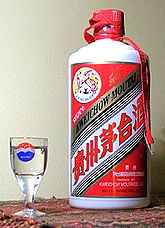- Maotai
-
- For Maotai wine's producer, please refer to Kweichow Moutai Company.
Maotai 
Chinese 茅台酒 Hanyu Pinyin Máotái jiǔ Transcriptions Mandarin - Hanyu Pinyin Máotái jiǔ Maotai, or Moutai (the latter spelling used by the producing company) (SSE: 600519), is a Chinese liquor, or baijiu.
It is produced in the town of Maotai (茅台镇), in the city of Renhuai, Guizhou province, Southwest China. It is believed that the town of Maotai possesses a unique climate and vegetation that contributes to the taste of the drink. Maotai, which is classified as "sauce-fragranced" (酱香, jiangxiang) because it offers an exceptionally pure, mild, and mellow soy sauce-like fragrance that lingers after it is consumed, is distilled from fermented sorghum and now comes in different versions ranging in alcohol content from the standard 53% by volume down to 35%.
Contents
History
During the Qing Dynasty (1644-1911), Maotai became the first Chinese liquor to be produced in large-scale production with an annual output of 170 tons.[1] In 2007, more than 6,800 tons of Maotai were sold.[2] Maotai is named after the town with the same name near Zunyi in Renhuai, Guizhou Province, where winemaking has a very long history. The Maotai of today originated during the Qing Dynasty and first won international fame when winning a gold medal at the 1915 Panama-Pacific Exposition in San Francisco. In addition, Maotai was also named a national liquor in 1951, two years after the founding of People's Republic of China. Maotai also claimed two gold medals separately at the Paris International Exposition in 1985 and 1986.[3] Maotai has won 14 international awards and 20 domestic awards since the Chinese Revolution.[4]
Maotai has been used on official occasions in feasts with foreign heads of state and distinguished guests visiting China. It is the only alcoholic beverage presented as an official gift by Chinese embassies in foreign countries and regions. It received additional exposure in China and abroad when Zhou Enlai used the liquor to entertain Richard Nixon during the state banquet for the U.S. presidential visit to China in 1972. It is one of China's official state banquet wines and claims to be one of the world's three best known liquors (together with whisky and cognac) and is therefore presented to all official guests of state.
Maotai current sells over 200 tons of Maotai to over 100 countries and regions across the world.[3]
In 2006, Maotai reported 5.3 billion yuan (about 688.3 million dollars) in sales volume, compared to about 4.2 billion yuan (about 538.46 million dollars) in 2005.[5]
According to an article named "Pouring a Big One" posted in the May 2008 edition of China Economic Review, Vin & Sprit (V&S) claims that baijiu is the world's most popular spirit, with annual sales volume of 520 million 9-litre cases compared to vodka with 497 million 9-litre cases. In this article, Maotai is reported to rank second in terms of market share compared with other Baijiu brands. Nonetheless it is still the brand presented at State Banquets. The following is a list of baijiu brands with their respective market share.
- Wuliangye (五粮液) 45%
- Kweichew Moutai (贵州茅台) 30%
- Guojiao 1573 (国窖 1573) or National Cellar 1573 10%
- Shuijingfang (水井坊) 10%
- Others 5%
See also
References
- ^ "Guizhou Maotai Liquor". Chinatravelz.com. http://chinatravelz.com/insight/things-insight/cuisine/maotai-liquor/index.asp. Retrieved 2011-08-10.
- ^ "Maotai Remains Short in Supply in 2008". English.cri.cn. http://english.cri.cn/2946/2008/01/08/195@311883.htm. Retrieved 2011-08-10.
- ^ a b "China-Guide bietet umfassende Informationen zu Land und Leuten, Kultur, Geschichte und Wirtschaft Chinas". China-guide.de. 2010-04-18. http://www.china-guide.de/english/a_profile__of_china/guizhou_province/. Retrieved 2011-08-10.
- ^ "China Kweichow Moutai Distillery Co., Ltd". China-moutai.com. http://www.china-moutai.com/en/maotai/honour.html. Retrieved 2011-08-10.
- ^ http://www1.cei.gov.cn/ce/doc/cend/200702132165.htm
External links
- China Kweichow Moutai Distillery Co., Ltd English 简体 繁体 website
- China Kweichow Moutai Distillery (Group) Co., Ltd
- Kweichow Moutai Distillery (Group) Co., Ltd
- Radio86 All About China: Maotai - The Spirit of China
 Chinese alcoholic beverages
Chinese alcoholic beveragesBeer in China • Wine in China Beverages Baijiu • Beijing Beer • Canton (liqueur) • Choujiu • Er guo tou • Gouqi jiu • Huangjiu • Kaoliang • Luzhou Laojiao • Maotai • Mijiu • Rice baijiu • Shaoxing wine • Tibetan beer • Wuliangye Yibin • Xifeng jiuIndustry CR Snow • Guangzhou Zhujiang Brewery Group • Tsingtao Brewery • Beijing Yanjing Brewery • Harbin Brewery • Kingway Brewery • Hangzhou Qiandaohu Beer Co., Ltd. • San Miguel Brewery Hong Kong (serving Hainan)Categories:- Companies listed on the Shanghai Stock Exchange
- Chinese distilled beverages
- Guizhou
Wikimedia Foundation. 2010.
